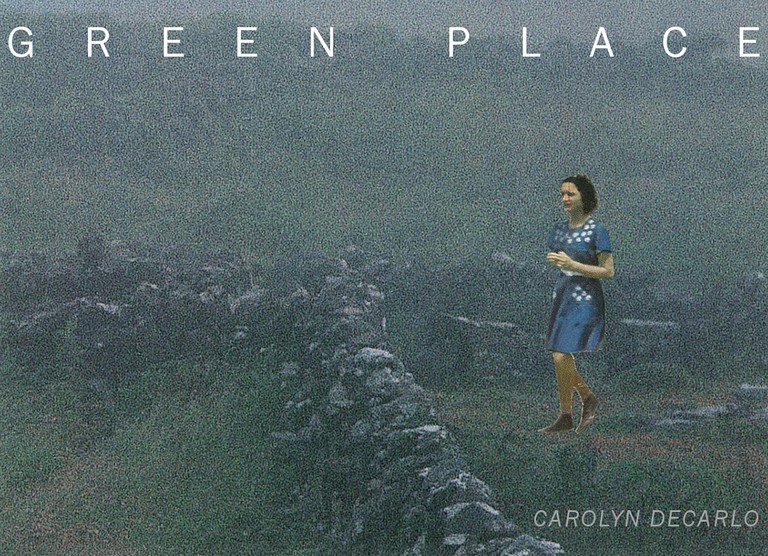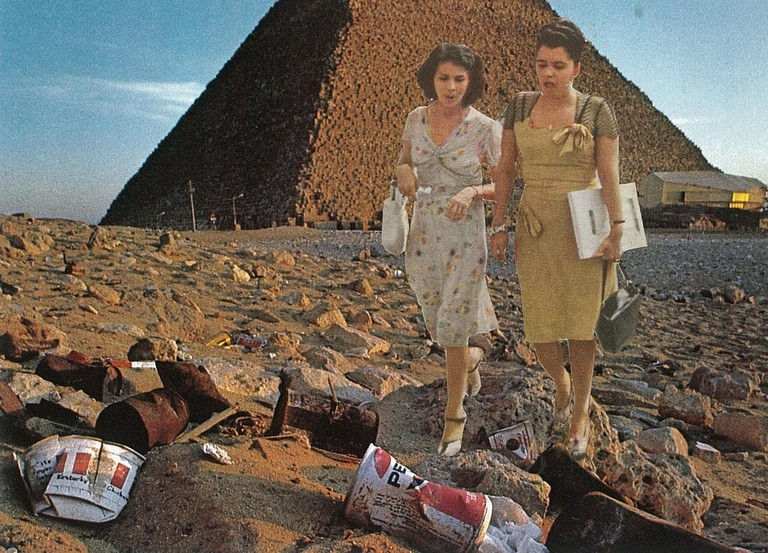The Occasional Journal
Love Feminisms
November 2015
-
Editorial
Alice Tappenden, Ann Shelton -
Feminisms in Contemporary Art Project Spaces
Kari Schmidt -
Considering Merata Mita’s Legacy
Chloe Cull -
Armour. Armor. Amor. More.
Zoe Crook -
Green Place
Carolyn DeCarlo -
This mud body
Robyn Maree Pickens -
Body Language
Lana Lopesi, Louisa Afoa -
CONVERSATION
Creek Waddington, Sian Torrington -
Bloody Women Artists
Ruth Green-Cole -
the blue between me and you
Jo Bragg -
Urban Form and the Gendered Lens
Rosie Evans -
A guide
Rachel O’Neill -
Gender and the ANZAC Biscuit
Lindsay Neill -
Recovering Pieces: Finding an early history of women and photography in New Zealand
Lissa Mitchell
Green Place
Carolyn DeCarlo
—

© Carolyn DeCarlo
Origin Story
The world is a skull
spinning on a wheel.
Pull off the wheel and
hold it above your head.
Offer it as a token
to the guardian at the gate,
the one who will usher you
into Valhalla
I live
I die
I live again.
But we know the truth.
Who killed the world?
The world is not a skull
spinning on a wheel,
it is a Green Place,
it is an origin story
as old as the gods
carried over on a seed.
Aituā
The King is the root of it all —
one man, the silence, and all that power.
Powder his face and comb his hair,
adorn him in trinkets of glory.
Swaddle him in blankets, or better,
make him shine like the finish
on a 1959 Cadillac Coup de Ville—
Take that away,
and he’s just a boy in a robe.
Mote Wāhine
He tau mote wāhine,
it is a year for the female.
Tāwhiao quoted the whakataukī
after she killed her dogs for him.
A chivalrous act—
a sacrifice for the greater good.
One year for the woman,
but only after an expense had been paid.
That is the limitation of gratitude,
a worth summed up
in hours and days.
The years stretch before them
and only one declared their own.
If you were born to breed,
where do you go when that time is up?
What do you do with the remainder?
Raise wild dogs,
chase them around the Wasteland,
let them call you whaea
when no one is listening
except for the wind
and the desert
and the clouds racing toward you on the horizon.
FURIOSA
Pūrākau
This is my mythology:
bunched linen
tucked into three straps,
summed up in a choice
of costuming.
Where is my hapū?
I am pregnant with dread,
the Wasteland is unkind
and my sisters, my taina—
my tamariki whāngai.
This is my mythology:
a bundle of cloth
across my chest,
and the Immortan.
Kainga
Dreams of the Green Place,
heady and wild,
when my body was whole—
my arms so long they touched the sun.
Whaea, you said, meaning
mother of myself
and mother of my initiation.
What kind of dream is this?
7000 days, a lifetime—
a place of past,
a place of memory
like a library—
an erasure:
a swipe of grease
across the forehead
and she is gone
in three days,
she is gone to the Green Place.
Furiosa’s Mihi
I am one of the Vuvalini,
of the Many Mothers.
My initiate mother was K.T. Concannon.
I am the daughter of Mary Jo Bassa.
My clan was Swaddle Dog.
Twilight of the Gods
In the Green Place,
you watch the unnamed one
pour through the last of the bullets,
the anti-seed—
plant one and watch the thing die
and wait for the last
to take hold
but he stops short.
Hands the rifle to you.
Holds his breath
as you balance it
on his shoulder.
A voice in your head says,
Put the crosshairs on her nose
and you
Steady,
Take aim,
Fire,
watch as it catches,
blinding its maker,
the tiller of anti-seed.
I am the scales of justice,
the Bullet Farmer roars—
not as loudly as you will,
consumed in the no-home,
in the loss of redemption.
If his arms are the scales,
the balance is in your favor.
Only fair:
he’s lost his eyes—
yours are about to be opened.
Blood Bag
In a quiet room somewhere,
maybe in Idaho,
you are locking eyes
over frosted beers.
There is a lot of wood paneling
and static electricity.
This could be Road House
on a slow night,
or a version of Dirty Dancing
where Patrick Swayze played Baby,
Jennifer Grey lifting him over her head.
I am the one who runs
from both the living and the dead.
Give me a cliché that is not suited
for a man and a woman in love.
Give me a word for brother-love
that is not bound to Patriots, to Black Hawks,
to men for others.
Give me a way to trace the shape
of a relationship formed from mutual distrust—
not so unusual, so what is it?
What is in a name?
Or, better—
what’s in an un-name?
The desire to remain unnamed.
The story goes:
when you give up your name,
you give up a piece of yourself.
Eventually, this is worth doing.
Imperator
I am tuakana.
My existence is dependent
upon the other, the taina—
the bundle of limbs
and wide eyes
under my feet.
How many women have you served
in your lifetime?
How many women
brought freely into the desert?
1-1-2-1. Red. Black. Go.
I would give my life for them
a thousand times.
FIVE WIVES
Anghared
Much loved one,
and so she is—
the Splendid.
In fantasy,
she is the goddess of birth,
bearer of wisdom,
keeper of the seeds.
In truth,
she has been a witch,
a miner’s daughter,
a novelist.
She has lived mostly
in a country whose name
confounds the world so much
they changed it.
Instead, she names it
Crescent Grove,
Corellon’s palace,
The Citadel.
They think she carries
a perfect thing inside of her—
a safeguard,
a talisman.
But it is anti-seed
and it is set for destruction.
A Dag—
not fit to do
what?
Kept pure,
locked in
by a belt.
She is chaste,
what is that?
The introduction
of a concept
by man,
pure of heart
and spirit,
of course.
The notion of
illegitimacy
and the law’s
condemnation of it.
Pregnancy hapū
creates property tamariki—
this is not tradition.
Capable
She finds him,
curled up like a koru
in the back of the War Rig.
Dependable red-head,
I can do it,
she says to Furiosa—
I can do it.
Makes you wonder
if he could have done it
without her.
Hands cupped,
they form a new thing,
hope—
in the future,
in each other.
Inu
Glasses clink around the circle
and a pair of roving eyes catches yours,
glazed but serious, earnest—
unsettling in their co-operation
with the brain.
I propose a toast,
only appropriate at weddings,
occasions of great importance,
not here in the Wasteland,
a circle of five women dressed in white.
Toast carries the bullets,
counts them and remembers to subtract
four left, three, two—
she, too, is capable,
confident in her knowledge.
She knows things
before they happen?
No, but—about them happening.
She is ready for them.
Fragile
We don’t know much about this girl,
do we?
She could be anyone.
A catalogue of facts:
She’s the youngest,
She’s the only one who asks to go back.
She’s the one who’s given up as bait.
She survives.
Another fact:
Girls like Cheedo exist.
Is it an erasure
to ignore this,
to invalidate this response?
A person hides themselves,
a person fears what isn’t known,
a person wants to be needed,
a person recognises:
being found will be hard,
staying lost could be harder.
A person wants to stay alive.
When you’re the prized,
you’re given privilege.
In the beginning,
there may be room for hope.
She isn’t the role model —
she is a station of the self.

© Carolyn DeCarlo
Keeper of the Seeds
Kuia carries the seeds
in a leather carpet bag
she holds tucked to herself
for luck.
She counts them out:
One for the men
we buried in the sand,
Two for the mothers
who carried our land,
Three for the Green Place
where we will all go,
Four for the crows,
who stole our home.
When Papatūānuku ate the seeds,
the Earth was born.
Give me just one seed
and I can grow a world inside me,
whenua slipping out
between my legs,
placenta unfurling into mamaku.
Whānau
There is no property in children,
Miss Giddy used to say,
no owning a woman or a child.
Having a baby in the Wasteland is hard work,
but raising a child in the Citadel is impossible.
If you deliver your child to the whānau
your child will bring good fortune.
Whāngai children are special,
held in high regard, the chosen ones
of many homes, but still one whānau.
On Being Immortal
White powder blown
from the mouths of slaves
onto fissured skin the shade
of old garlic cloves
to keep away pain.
His power was sick,
all boils and cancer
obscured, and yet
laid bare by Plexiglas,
the hardened muscles
and medals molded,
a false layer
lacquered over
his deflated skin
for luck, for trust, for might.
They say his eyes were red—
red as pricks,
red as the river flowed
when his mask was torn away.
What kind of infant wears a mask?
You know the answer to this.
You were an infant once yourself,
in the Wasteland.
History Woman
In the end, it is not a mask
that separates you,
it is a series of scryings,
a map drawn out across your face.
She is kuia, and you,
you are kuia, too.
Beware, Immortan.
When you gave them History Woman
you gave them power—
knowledge wasn’t ever yours to give.
Kōpū
He says, I myself
will carry you
to the gates of Valhalla,
but he never carried you.
He’s never carried anything
human inside of him, not once.
Sooner or later,
someone pushes back.
Carry something long enough
and it will kick a hole in you.
VALKYRIE
Valkyrie
What do you know of the North?
Your bones are bound to the desert,
bait for the battlers,
the lone wolves, the profiteers
coming to stake their claim
on the Many Mothers—
but they will fail
many times over.
Your keening is louder
than even the War Boys’
cracked lips
on their chrome-coated
journey to Valhalla.
You thread through the dusty sky
covered only by your own skin,
searching for worthy ones.
If only they knew—
you were the one with the power,
you were the last of your kind
and when they managed to kill you
no one would be carrying them
to the gates of Valhalla,
least of all Joe
(not immortal at all,
just a dried up old war man,
worn as the husk of an old garlic clove,
pumped full of air).
At least this way,
you’ll live and die
without bearing their mead
in the hall of the slain.
Dust and sand have borne you
and your sisters far away
from the grasping hands of Odin,
and that is a small seed of comfort
for you to carry, perhaps.
Sessrúmnir
Valkyrie, are you
one of many? Or,
are you she—
the chosen one, Freyja,
ruler of Fólkvangr?
Oh, go on, show us your cloak
of falcon’s feathers,
your chariot of cats,
your red-gold tears.
Let us go to your ship now,
the great hall that bears
your warriors upon the sea,
and take in the waters.
It is time to bring them
freshwater to drink.
The many Wretched
are in need of it—
theirs is a big thirst,
and it is long
since it has last been sated.
Freyja
How do you choose
your beautiful, fallen warriors?
Are they the ones with the tears,
the ones who broke hearts,
the ones with dimples and curls
or chiseled jaws,
the valiant ones,
the hardest to fall,
or—
No.
The most disgusting men,
you bear to your breast
with a sly grin,
their fingertips just shy of Odin’s clasp,
sweaty dream-cape of Valhalla
ripped to shreds
by a woman
riding a chariot
led by cats.
The Bright-Eyed One
Set your sights on the skies—
not back to the Green Place
but rather up, to the black dots
glimmering at its edge.
They’re drawing closer,
feathers dripping corpse-blood,
good fortune for the Vuvalini,
the Many Mothers living in the no-home.
There is not much choice
between a salt field and a swamp.
Take up the wisdom of the raven,
it’s pitched deeper even than the cackling
of the crows who stalk the swamplands
and pool at the feet of the stilt-walkers,
damp feathers tangling with the shrouds
until their crafty bodies are lifted up
and carried across the night.
The ravens are coming
with beaks all gory, at break of morning
warning of battles waged and lost
far back along the trail beyond the Green Place,
beyond the lightning storms, in the belly of the Wasteland.
And you, Tūī, white-throated raven,
the bright-eyed one, where will you go?
West to the salt flats, the dried up old whale-road,
or back along the desert hills to the Citadel
dripping emerald from its haunches?
No, Tūī, go North, Tūī.
Hide your shimmering plumage
among your blood-soaked friends,
chase the tail of the sun
until it leads you to Valhalla.
Aotearoa
In truth, there were thirteen maidens,
a perfect snatch of fragile things
carried in a crate by Odin himself.
The hens bore them all out one night,
a miracle when their shells held.
Odin lined them up and named them,
stroked them thoughtfully with his thumbs
and tried to keep them safe—
but he was only a man.
Eventually, in a night-sweat,
dreaming he was someone else
Odin cracked his lips and
Mist slipped her hand between them,
shouldering her way out,
a long white cloud forming on the horizon.
Acknowledgements
Lines from Mad Max: Fury Road were used in Origin Story, Furiosa’s Mihi, Twilight of the Gods, Blood Bag, Imperator, Capable and Kōpū, and often appear in italics.
The whakataukī quoted in Mote Wāhine appears in full in “The Negation of Powerlessness: Maori Feminism, A Perspective” by Ripeka Evans.
The first and last lines of Whānau are quoted from “Maori Women: Caught in the Contradictions of a Colonised Reality” by Annie Mikaere.
The Bright-Eyed One includes a quote from the fragmentary skaldic poem Hrafnsmál, generally attributed to Thorbjörn Hornklofi.
The work of several Māori feminist scholars proved invaluable in my research leading up to the creation of this series, including Annie Mikaere, Ripeka Evans, Mei Winitana and Paulé Aroha Ruwhiu.
Thanks to the NZETC at the Victoria University of Wellington Library for providing electronic access to the full text of Takitimu by Tiaki Hikawera Mitira (aka J.H. Mitchell). Thanks to Te Papa, Te Ara, Te Tāhuhu o te Mātauranga (Ministry of Education), Te Minitatanga mō ngā Wāhine (Ministry for Women), and the Mad Max Wiki for providing the quick facts.
Threading together the mythography of Mad Max with study of pre-colonial Māori life and myths led me down avenues I never expected; in particular, the Valkyrie series, which brought in elements of Norse mythology through the Poetic Edda and skaldic poetry. Thank you to Ann Shelton and Alice Tappenden at Enjoy Journal for giving me a platform to explore this. What I thought would be a straightforward series of poems about Mad Max: Fury Road became something far more web-like.
Thank you, George Miller, for not being an awful director, and for choosing to consult with Eve Ensler. The genre of the action film still has a long way to go, but Fury Road felt like a win.
A final thanks to my friends in Wellington and on Twitter who put up with all my chattering aboutMad Max over the past several months, and to my partner and best friend Jackson Nieuwland for being my sounding board for everything.
Bibliography
Evans, Ripeka. “The negation of powerlessness: Maori feminism, a perspective.” Hecate 20.2 (1994): 53.
Hornklofi, Thorbjörn. “Hrafnsmál.” In Old Norse Poems: The Most Important Non-skaldic Verse Not Included in the Poetic Edda, ed. Lee M. Hollander, 56-62. New York: Columbia University Press, 1936. Accessed August 11, 2015. http://sacred-texts.com/neu/onp/onp11.htm.
Mikaere, Anne. “Maori women: Caught in the contradictions of a colonised reality.” Waikato L. Rev. 2 (1994): 125. Accessed August 4, 2015. http://www.waikato.ac.nz/law/research/waikato_law_review/volume_2_1994/7.
Miller, George, Brendan McCarthy, and Nico Lathouris. Mad Max: Fury Road. Film. Directed by George Miller. Los Angeles, CA: Warner Bros., 2015.
Mitira, Tiaki Hikawera. Takitimu. Wellington: Reed Publishing, 1972. Accessed August 12, 2015. http://nzetc.victoria.ac.nz/tm/scholarly/tei-MitTaki-t1-front-d1.html.
Ruwhiu, Paulé Aroha. “Ka haere tonu te mana o ngā wahine Māori: Māori women as protectors of te ao Māori knowledge.” Master in Social Work diss., Massey University, 2009. Accessed August 12, 2015. doi:10179/1793.
Wintana, Mei. “Contemporary perceptions of mana wahine Māori in Australia: A diasporic discussion.” MAI Review 3.4 (2008): 1-8. Accessed August 10, 2015. http://www.review.mai.ac.nz/index.php/MR/article/viewFile/179/188.
About the Author
Carolyn DeCarlo is an American writer living in Wellington, where she runs the reading collectiveFood Court. She holds an MFA in creative writing from the University of Maryland, College Park. She has written a chapbook, Strawberry Hill (Pangur Ban Party 2013) and co-authored two chapbooks with Jackson Nieuwland: Twilight Zone (NAP 2013) and Bound: An Ode to Falling in Love (Compound Press 2014), winner of Auckland Zinefest’s Best Literary Zine of 2015. You can find some of her writing published or forthcoming from PANK, The Fanzine, Heavy Feather Review, West Wind Review, and Sweet Mammalian.
